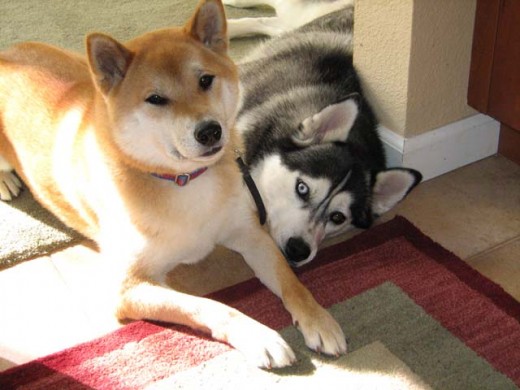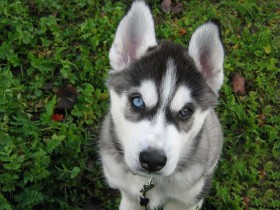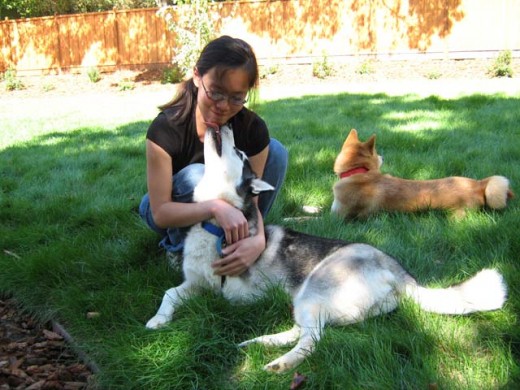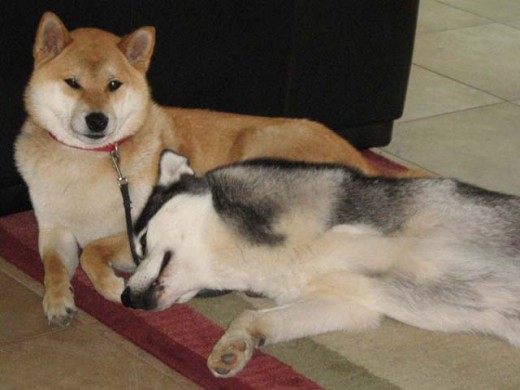One common reason for getting a second dog is to keep our first dog company.
The hope is that our dogs can spend their days playing together, and draining each other’s energy. When we come home, they will be happy to lie around, be calm, and be mostly well-behaved. Since the dogs have each other, there will be less need for us to play with them, walk them, or otherwise keep them engaged.
Reality however, is quite different from this idyllic picture.
In my experience, having two dogs is a lot more work than having just one, especially in the beginning. My dogs amp each other up, get more excited together, and lead each other into more trouble than before.
This is not to say that getting a second dog is a bad idea. However, I think that getting another dog for the wrong reasons, will degrade quality of life for everyone in the family, both human and dog.

When to Get a Second Dog?


I waited for over 1 year before getting another dog. I wanted the extra time to bond with my first dog, properly obedience train him, and make sure I had most of his issues under control.
Only get a second dog when we have good control over our first dog, and have ensured that he is mostly well behaved.
During the first year, I was very tempted to get another dog, as a way to keep my hyperactive Shiba Inu company. Now, I am very glad that I did not do so until both Shiba and I were ready. Having two hyperactive dogs, that were mostly out of control, would have been very stressful for everyone involved.
In addition, issues may arise with the new dog. For example, puppy Shania had issues with her leg, had to go through multiple surgeries, and a leg amputation. I do not think I would have been able to deal with all that, if my other dog were misbehaving at the same time.
I had to spend a lot of time with Shania during her recovery, and did not have as much time for my other dog, but he was totally ok with that for about 5 months.
Therefore, give yourself enough of a time, energy, and financial buffer. If you are starting to feel like you have way too much free time, and that your first dog is sleeping too much, then it may be time to get another. 😀

How to Pick a Second Dog

What type of dog should we get?
It is always important to get a dog that fits in with our lifestyle, temperament, and energy level. In general, we want to get a dog that has slightly lower energy than we do, and that will enjoy the types of activities that we enjoy.
In addition to all that, a second dog will also have to get along and fit in with the temperament, lifestyle, and play style of our existing dog.
1. Size of second dog.
My resident dog, Shiba Sephy, has a high energy play style. As a result, he frequently overwhelms smaller dogs, and they usually stay away from him during play sessions. He has most fun playing with larger, more boisterous dogs. His favorite breed during supervised play groups, is the Pit Bull Terrier.
I carefully observe my dog while he is playing, and try to identify the types of dogs that he likes interacting with most. In addition to fun, I also identify breeds that my dog shows the most positive and least negative behaviors with.

2. Temperament of second dog.


Being a Shiba Inu, Sephy does not do well with dominant dogs. He likes dogs that are as goofy as he is, and is more interested in playing, than in exerting dominance. While Sephy does not try to dominate other dogs, he will not back down if other dogs try to dominate him. This could ultimately result in a fight.
For a second dog, I made sure to get a puppy that was more submissive in nature.
In addition, the Siberian Husky breed is also known for being affectionate toward people, with a lower protective drive. This balances out my Shiba’s more aloof personality, and his natural watch dog instincts.
In this way, Husky can receive most of the human affection when Shiba is in aloof mode. Similarly, when Shiba alerts to noises around the house, Husky usually just ignores it. Therefore, they complement, rather than amplify each other’s energy.
Husky Shania is also very food focused, and much more interested in doing obedience exercises. After she joined our family, Sephy actually became more obedient because he would come over and participate in training exercises with us.

3. Meeting and greeting a new dog.


How we meet and greet a new dog greatly depends on the temperament of our current dog. In general, it is best for the dogs to meet on neutral territory (e.g. quiet park), so that our existing dog does not get protective over his home turf.
Some things to consider during the meet and greet –
a) Do not force the greeting.
I usually have both dogs on-leash and with separate handlers. Both handlers should be calm and in control. We bring both dogs into the meet area, observe their body language, and how they react to each other. If they seem calm, we try walking them around the park at a comfortable distance.
If all goes well, we slowly bring them in closer together. I observe them closely while doing this, and do not force a greeting if there is extreme stress or signs of aggression.
Like us, dogs are individuals and may not get along with certain other dogs.
Before getting Shania, I looked into adopting a Siberian Husky and had a couple of meetings. However, the rescue dogs got spooked by Sephy, and became stressed around him.
b) Test-drive the new dog.
I first took Shania home for a test-drive week, to see if she would get along with Sephy.
Most good local breeders and adoption/rescue organizations are flexible with the initial try-out period. In fact, they are usually willing to take a dog back, even when things do not work out in the longer term.
After all, everyone wants what is best for the dog.

Introducing a Second Dog into the Home
After getting a new dog, we want to focus on successfully introducing her into the home. Some of the things that helped my resident dog get along well with our new puppy –
- Positive experiences. I try to create positive experiences when both dogs are together. In this way, they will see each other as allies.
- Group obedience training. I have several group training sessions, where both dogs work together for me and get rewarded together.
- Consistent and fair rules. I make sure that I am consistent and fair with all my dogs. They follow similar rules, as well as receive similar consequences and rewards. I also make it a point to be fair with affection and attention.
- Rest time. Puppies tend to be on-the-go most of the time. I make sure that the new puppy does not bother my other dogs when they want to rest, or just want some peace and quiet.
- No stealing. I supervise my dogs closely to make sure they do not steal from each other. Stealing can encourage food aggression and resource guarding issues down the road.
Good luck with your second dog and feel free to share your experiences and questions with us below.

Hey Shiba Shake,
My boyfriend and I just got a new samoyed puppy. We have a 3 year old shiba inu. When we introduced them to each other it was in a general area and they seemed fine but then when we took her in the car, he attached her. We kept them seperate on the way home.
Once we got to the house Yoshi our shiba became extremely aggressive in our house. Snarling, trying to bite her. They got in some fights just over territory. They are beautiful on hikes but the territory really gets to him. He also is aggressive with his food. Our Samoyed is the sweetest puppy and is very calm.
The other night my boyfriend was sitting on the couch with Yoshi. Athena, the Samoyed, tried to come up and he went for her. In that attack my boyfriend put his face in the middle and was bit on his nose and lip by Yoshi. We are at our wits end and we don’t know what else to do. Please help!
Your friend,
Liat
I have a shiba as well and want a second dog but I can totally see this happening! Did you find a solution?
I have a female cockalier. She is the best dog in the world. Laid back although she loves play time. She doesn’t bite. I am looking for a compatible mate….Suggestions???
HI, I am looking for some advice. My boyfriend and I have a 3 year old border collie. We want to get a companion for her so she isn’t alone while we are away at work and so she has a play mate when we can’t match her exercise needs after a long day at work. She is well behaved and is trained plus some tricks. She does have one issue though, she is scared of other dogs. We are working on it and she had shown improvement it will just take sometime. She grew up with a small skipperkie who was not a fan of puppy Vixen, so her fear is mainly directed towards older and smaller dogs. Though very excited dogs make her nervous too. She is very happy to see and meet dogs through her fence, but the moment they are inside the fence or there is no fence she tucks her tail and hides behind dad. There was one exception of this with a husky pup we met on a walk, she wanted to say hi so badly but the owners weren’t too willing for them to meet. She wasn’t being aggressive either, her tail was wagging and she was winning as she tried to go towards him. They did get to sniff each other a bit, we were so surprised as any other dog she saw she wanted to avoid. Since Picky(the skipperkie she grew up with) is a female small older dog we were thinking a calm male dog about Vixen’s age and size would be best for her. There is even one we found who needs a home, but he adores other dogs though he is very calm and sweet with them. We have a meeting set up, but won’t go through with anything until we know with out a doubt Vixen will be comfortable with him. I appreciate any advice you have!